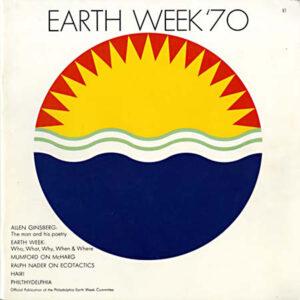Remembering the First Earth Day
By Alyssa Bennett (GR ’20) as told by François Amar
On April 22, 1970, the environmental movement in the United States coalesced around the first Earth Day with demonstrations and teach-ins all over the country. Perhaps nowhere was the fervor more apparent than in Philadelphia where the action expanded to a full Earth Week, culminating in a great gathering of around 50,000 in Fairmount Park on Earth Day. Dr. François Amar, now a professor of chemistry and dean of the Honors College at UMaine, was there.

When we caught up with François, he reminisced about that day and also about how his own work on the Earth Day teach-in at Wissahickon High School, located in the Ambler suburb of Philadelphia, got him started as an activist. “It really was a grass-roots movement,” said Amar, “bringing environmental leaders, scientists, and progressive politicians together with college and high school students in a broad coalition.” Edmund Muskie, a senator from Maine, was the keynote speaker at the Philadelphia event—the Clean Air Act he championed would be passed in December of that year. Amar continued, “I got my start as an activist with that event. I worked with students, teachers, and the administration of the school to organize the teach-in at the school on that Wednesday. Having participated in several enrichment programs in science and engineering at local universities, I invited a couple of the professors I had met to present workshops at our school. One of our own social science teachers, Mr. Driedger, also gave one of the workshops.” Amar recalled, that morning, while the Wissahickon students moved through each of the 45-minute workshops that were repeated three times, he didn’t actually attend more than a few minutes of any presentation as he circulated with a small team of students to make sure everything went off without a hitch.
When asked about how the school administration felt about taking a school day to discuss these topics, Amar noted that many environmental issues were becoming obvious at that point and the teachers were very happy to work with students. The school was so supportive in fact, that the students were allowed to leave at noon to attend the big teach-in at Fairmount Park. Speakers included Ian McHarg, one of the leaders in ecological public planning, as well as Muskie and others. Amar recalled hearing Native American band, Redbone, and being impressed by beat poet Allen Ginsburg, who also spoke. “The atmosphere was festive, like a rock-concert,” he said. “I touched base with my classmate Carolyn Driedger [daughter of that teacher and now a USGS geologist] and she recalled the day and shared the following with me, ‘At the cusp of young adulthood, the aura of the day was electrifying; it was a pivotal experience. Sitting on the grass in Fairmount Park, listening to music and hearing talks, I had a sense of being one with the world, of enjoying being with like-minded people, and feeling empowered. Now and again I think back on it, and recognize that it introduced me to the concept of personal civic engagement.’ She captured the feeling I had very well, and I went on to engage with other issues like the anti-Vietnam war movement; international human rights causes; and work with PICA, here in Bangor, to help end the terrible U.S.-backed wars in Central America.”

The Wissahickon High School newspaper, the Trojan Times, emphasized, “Earth Week is to make people aware of the balances which keep the planet alive and how to keep from destroying them.” Amar noted that while the Vietnam War protests divided the country, there was very broad support for environmental causes, and that support helped fuel passage of the Clean Air Act in 1970 and the Clean Water Act in 1973. When asked about the environmental issues that are prevalent today, Amar said, “As in the past, environmental concerns are pitted against economic interests. It is clear today, however, that the clean energy movement has the power to remake the world economy as well as to address the problem of climate change.” He added, “We can’t wait to take action, folks shouldn’t wait until the end of the year, until they finish their degree, or for a lull in their personal life to get engaged. Active engagement is the only real antidote to despair.”
This Wednesday, April 22, 2020, on the 50th anniversary of Earth Day, many of us will be restricted indoors and certainly will not be able to attend a mass demonstration in person. Take some time to think about the environment, the landscapes we love and wish to roam freely with our families and friends. Find inspiration in the high school students from the 70’s and start now to educate yourself and take action to rescue the earth.
